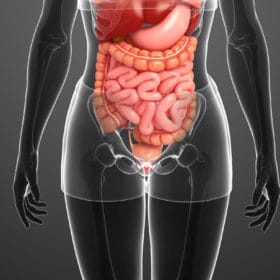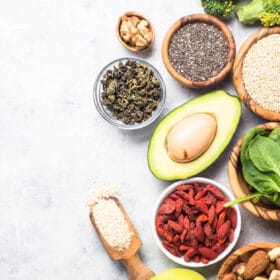Many experts and athletes argue about this topic. Some say: "Calories are everything." Others are of the opinion that hormones play the decisive role. What do you think? There is a consensus on the essential role of protein and vegetables in the diet, on the dominance of strength training in terms of physical activity and on the importance of proper sleep and stress management.
Is a calorie a calorie?
Calories are important, but they are not everything. There are two things that are necessary for sustainable and lasting fat loss: A calorie deficit and a balanced metabolism. You can lose weight over a period of time. But if you do it the wrong way, you risk gaining the weight back (in 95 % of those who lose weight) and getting even fatter (in 66% of cases).
Why is that?
Most people think that's how the metabolism works:
You burn calories, lose weight and end up with a balanced metabolism.
It actually works as follows: First you need to achieve a balanced metabolism. Then you reduce calories naturally. So you can lose weight effortlessly.
Calories are only one part of the equation, and their meaning can vary. To understand this, you should know the three general guidelines of metabolism.
1 - Metabolic compensation
If you eat less and exercise more, you will get hungry, feel tired all the time and slow down your metabolism. This thermogenesis varies from person to person. On average, you will burn 300 calories less than if you were not on a diet. In individual cases, it can also be significantly higher (500 to 800) or lower. With such an approach, you would definitely lose weight in the first few weeks before metabolic compensation and the associated thermogenesis set in. Eventually, your body will become "keen" on sweets and fatty foods, which is why you are likely to "hit it" again after the diet.
Ultimately, you have three options:
a. You can redouble your efforts and make things worse.
b. You give up.
c. You take an intelligent approach and set yourself the goal of a balanced metabolism.
A balanced metabolism through the assessment of the HEC
The metaphor of a metabolic credit card is the best way to describe losing weight with a poorly balanced metabolism - as described above. You get a short-term benefit, but later you have to pay dearly for it. Your key to understanding metabolism is "HEC". This abbreviation stands for the words "hunger, energy and cravings". If you have your HEC under control, your metabolic system is almost certainly balanced. You may even be in a calorie deficit without realizing it. The effects of calories on the HEC are different. A piece of chicken breast is more likely to maintain your balance than a donut. Studies have shown how replacing calories from carbohydrates with those from protein results in greater weight loss, more fat loss, more muscle maintenance and less tendency to gain fat.
Combinations of calorie types
A crucial point for metabolic balance is the way the combination of calories affects the HEC. The key is the ratio of sugar, fat and salt. This combination, which is mainly found in fast food, can not only create an unnecessary appetite. It also increases the desire to eat more and more of it. This is the most common reason why people cheat on themselves.
2 - The multitasking of the metabolism
Your body can only do one thing at a time. Either it burns fat or it builds it up. It reacts to what it gets. This is why this guideline is also referred to as "metabolic demand". Excess calories do not inevitably lead to more fat, and calorie reduction does not always equate to fat loss. The standard approach (eat less, move more) leads - according to research - to 20 to 50% loss of lean tissue (water, glyogens and muscle). This has an impact on your basal metabolic rate, as muscle mass plays the decisive role here. Instead, you should build up your muscles - as well as your water and glycogen balance. Depending on the requirements, excess calories are converted into fat or muscle. That's why all the experts say that strength training is the most important form of exercise. It is the only way to convert the extra calories into muscle. While about a quarter of weight loss in endurance athletes is due to muscle mass loss, 100 % of weight loss in strength athletes is due to fat loss. You can never separate your diet from your lifestyle, because almost everything you do has a greater or lesser impact on your metabolism.
3 - The efficiency of the metabolism
The human body is not a perfect machine. With calories from proteins, more energy is lost as heat. With carbohydrates, less is converted into heat. The most efficient macronutrient is fat. The less efficiently calories can be stored, the better it is for your intentions. Both carbohydrates and protein have four calories per gram, but your body will store fewer of these calories if you eat protein instead of carbohydrates. Proteins are not only more thermogenic and less efficient. They are also very filling and offer THE resources for muscle building par excellence. Protein is one of the best tools to fulfill all three metabolic guidelines. So a calorie from protein is not the same as a calorie from carbohydrates.
POPs and bugs
POP is an abbreviation for "persistent organic pollutants", which you ingest from the air, food and water. They accumulate in the body and are stored in fat. If you lose weight, the POPs are released from your fat and cause your metabolism to work more efficiently. They achieve this by "short-circuiting" your metabolic hormones (especially those of the thyroid gland). POPs have more to do with weight gain than the hormone leptin. Now you know why it's so important to pay attention to the quality of your food. POPs accumulate in the fat of the animals you eat. You should therefore make sure you eat a low-fat diet and choose organic meat wherever possible.
Then there are the "bugs". This term is used in medicine worldwide to describe the bacterial population in the human gut (probiotics). There are more bacteria in your digestive tract than cells in your body. According to research, certain bacterial colonies have an effect on the efficiency with which food is digested and calories are absorbed. The bacteria are the first to reduce your calorie intake because they need the energy it contains. You may well notice significant weight loss (1 kg) and a visible reduction in your waistline if you add probiotic supplements to your diet for just 12 weeks.
Ask the right questions
The question "Is a calorie a calorie?" no longer applies to you. Instead, you should want to know how important calories are for short and long-term fat loss, and what other factors influence the use of calories. If you work with your metabolism instead of against it, you will know that quantity and quality are inextricably linked.






